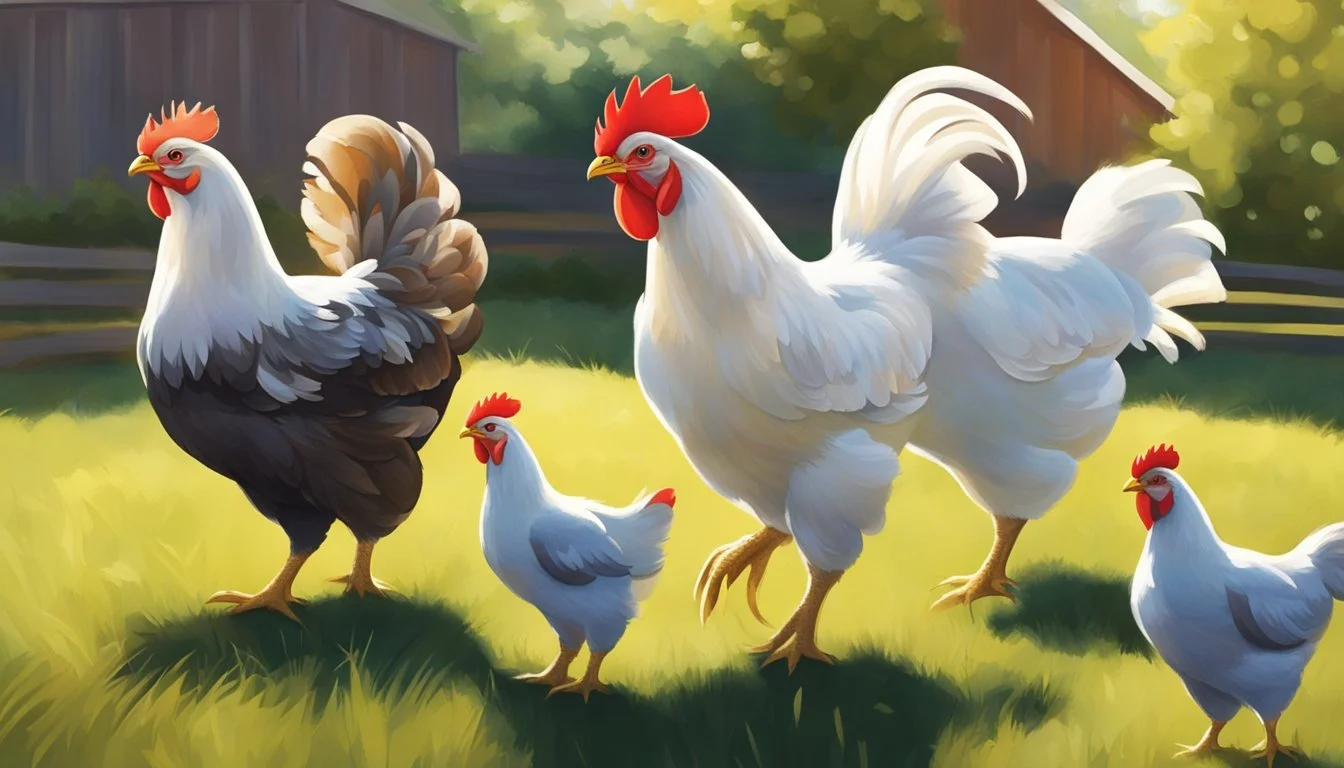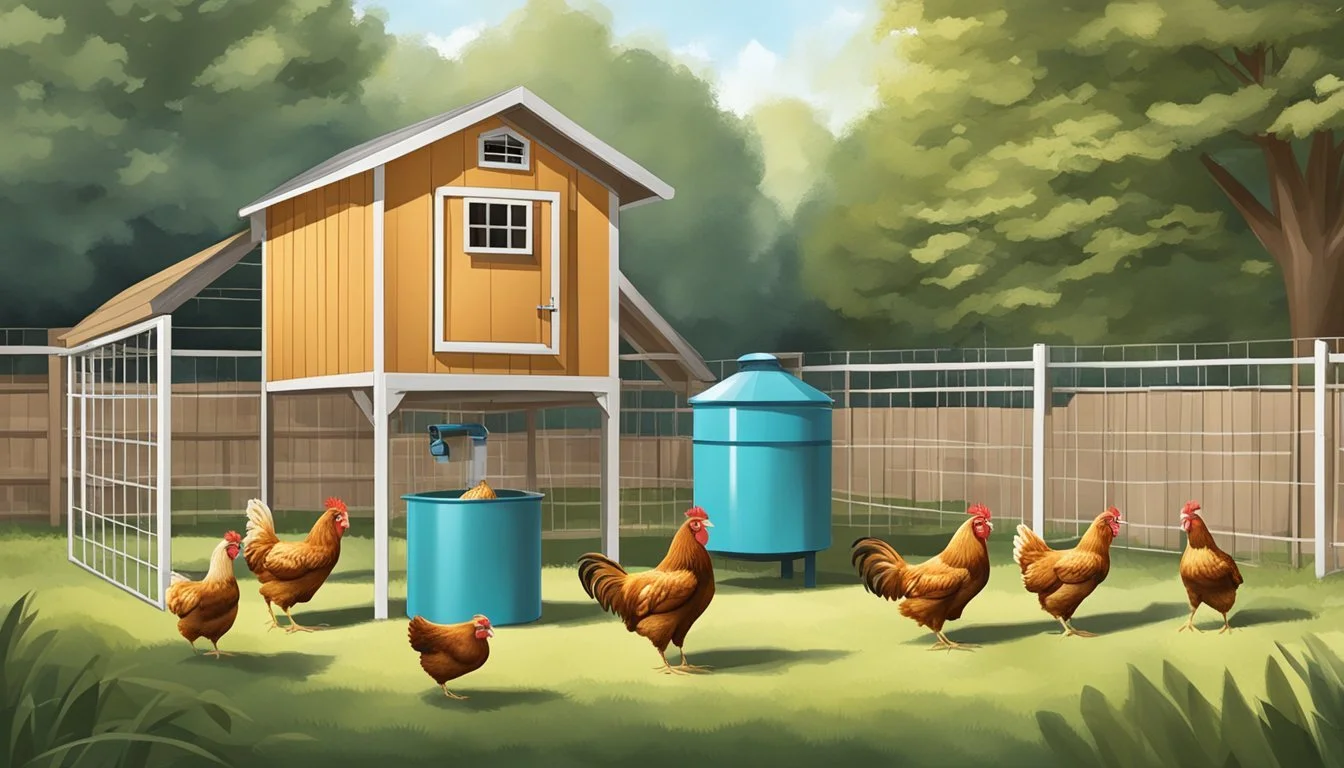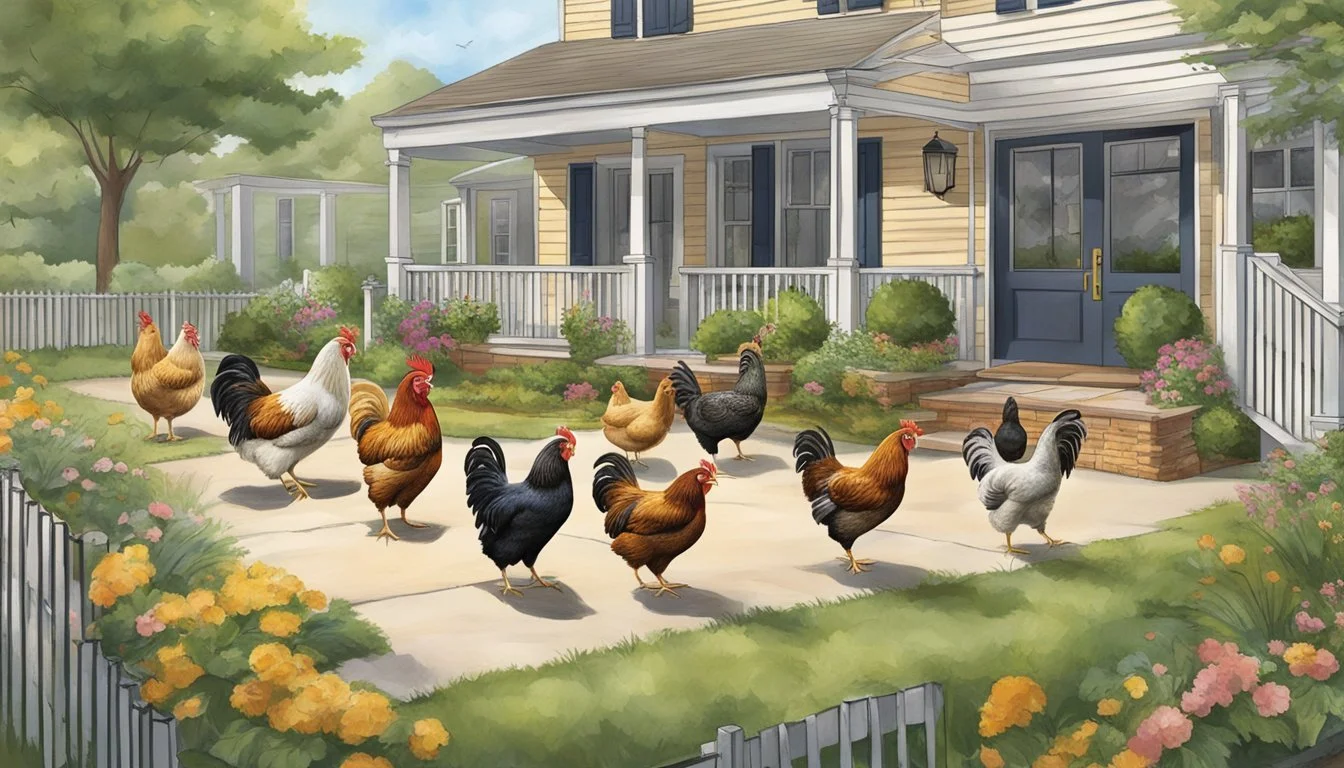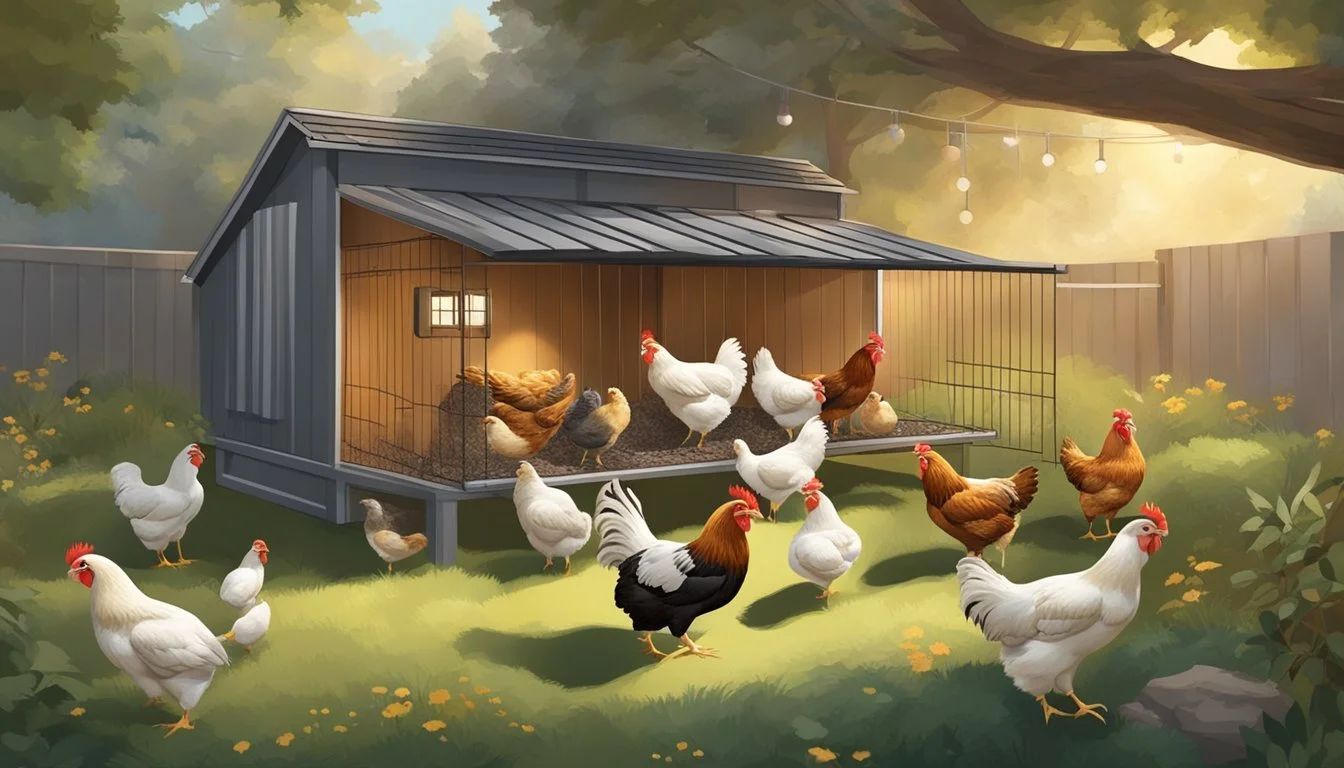Raising Backyard Chickens in Spartanburg, SC
Essential Tips for Beginners
Raising backyard chickens has become a popular venture for residents in Spartanburg, South Carolina, offering a way to produce fresh eggs and promote sustainable living. The city, as one of the first in the Upstate region to
Understanding Local Chicken Ordinances
Before planning to raise chickens in your backyard in Spartanburg, SC, it is essential to familiarize yourself with the local city code and permit requirements. These regulations are enforced to ensure humane treatment of the chickens, prevent nuisances, and maintain public health.
Spartanburg City Code
In Spartanburg, SC, residents are subject to city ordinances that regulate the keeping of backyard chickens. The city code requires that chicken coops be placed at least 50 feet from any neighboring residence, which ensures that neighbors are not disturbed by the chickens. These coops must also be properly ventilated, maintained in a clean, dry, and odor-free condition, which is crucial for the health and wellbeing of the chickens and the surrounding area.
Fenced enclosures are mandatory to protect the chickens and to prevent them from roaming freely. The enclosures need to be secured to deter predators and pests. Residents are allowed to keep up to 6 domesticated female chickens, but roosters are explicitly prohibited due to noise concerns. Any construction for chicken keeping should use washable materials to enable regular cleaning.
Permit and Licensing Requirements
Obtaining the proper permit is a vital step in legally raising chickens within Spartanburg. The local government requires residents to acquire an annual permit to keep hens. Additionally, one must obtain written permission from all abutting property owners. This ensures that those living in close proximity are in agreement with your chicken raising activities, providing a community-conscious approach to urban farming.
Furthermore, the storage of chicken feed must be in containers that are inaccessible to rodents and pests, which is important for both the chickens' health and to avoid attracting vermin. Selling eggs is permitted under certain conditions, such as clearly labeling them with the date they were collected and ensuring proper storage at or below 45 degrees Fahrenheit.
In conclusion, compliance with the South Carolina chicken ordinances and the specific city ordinance of Spartanburg is non-negotiable for residents who wish to engage in backyard chicken raising. It is advisable to consult directly with local regulatory bodies for the most current information and full details on the requirements.
Setting Up Your Chicken Coop
Creating a suitable environment for backyard chickens in Spartanburg involves understanding local regulations and ensuring the safety and comfort of your chickens. The coop construction must abide by specific standards, and its location within your property is regulated for neighborhood safety and harmony.
Coop Construction Essentials
Spartanburg regulation enforces that chicken coops must be fully enclosed with a solid floor and made from washable material. This is imperative for sanitation and to prevent predators from gaining access. Coops should provide a minimum of 2-3 square feet per chicken inside to ensure they have ample space to exhibit their natural behaviors. A well-ventilated space is critical to keep air circulating and to prevent the accumulation of moisture and odors.
Ventilation must be adequate to keep the coop dry and odor-free, but also ensure it is free from drafts, particularly in colder months.
Lighting in the coop can be a combination of natural and artificial sources to regulate the chickens' laying cycles and provide warmth.
Heating might be necessary during Spartanburg's cooler months to maintain a comfortable temperature inside the coop.
Coop Positioning and Safety
The coop must be positioned at least 50 feet away from any neighboring residence.
Fenced enclosures are recommended to provide an additional layer of protection against predators while allowing chickens to roam outdoors safely.
Each bird must have at least 8-10 square feet of outdoor space for adequate roaming.
Automatic coop doors can be installed to regulate the chickens' access to outdoor areas, enhancing safety during night hours and the convenience of managing your flock.
Regarding the number of chickens allowed, residents are generally permitted to keep up to six domesticated female chickens, while roosters are not allowed due to their noise levels. Residents must obtain an annual permit to raise backyard chickens.
Adherence to these requirements will pave the way for a healthy and compliant backyard poultry experience in Spartanburg, SC.
Choosing the Right Chicken Breeds
When considering the introduction of backyard chickens in Spartanburg, SC, it is crucial to select breeds that not only align with your egg production goals but also thrive in the local climate.
Best Breeds for Spartanburg Climate
Spartanburg, South Carolina, experiences a humid subtropical climate with hot summers and mild winters. The chosen chicken breeds must be resilient and adaptable to these conditions to ensure healthy growth and consistent egg production.
Australorp: Known for their high egg-laying capabilities, Australorps are a suitable breed for the Spartanburg region. They can produce over 250 brown eggs annually and are recognized for their docile nature, making them easy to handle for beginners and families.
Trait Detail Egg Production High (over 250 eggs/year) Egg Color Brown Temperament Docile Climate Adaptability Tolerates heat well
Sussex: The Sussex breed is hardy and can cope with varying temperatures, making it a versatile choice for the fluctuating seasons of Spartanburg. They have a calm disposition and are reliable layers, providing a steady supply of eggs throughout the year.
Trait Detail Egg Production Good Egg Color Light brown to creamy white Temperament Calm Climate Adaptability Tolerates both heat and cold
When choosing to keep chickens, it's important for Spartanburg residents to remember that roosters are generally not permitted due to noise ordinances, so the focus should be on selecting hen breeds for egg laying and companionship.
Daily Care and Maintenance
Proper daily care ensures that backyard chickens in Spartanburg, SC are healthy and their environment is safe and hygienic. This routine encompasses feeding, coop cleaning, and maintaining the chickens' health and wellness.
Feeding
Backyard chickens require a balanced diet that typically includes grains, proteins, and calcium. Feed should be distributed in chicken feeders to prevent waste and contamination. It's important to provide fresh water daily and to check feeders for spoilage to keep the feed dry and mold-free.
Morning: Offer a portion of chicken feed to ensure energy throughout the day.
Evening: Another feeding can ensure they have enough nutrients.
Coop Cleaning
A clean coop is essential to prevent diseases and maintain a hygienic space for the chickens. Coop cleaning involves using washable materials for easy cleanup and keeping the space dry and odor-free.
Daily: Remove droppings from nesting boxes and change any soiled bedding.
Weekly to Bi-weekly: A more thorough cleaning to remove droppings from roosting bars and to rake out the floor should be done.
Using natural coop deodorizers can help in keeping the coop smelling fresh.
Health and Wellness
Monitoring the health and well-being of chickens is an ongoing responsibility. This involves observing for any signs of distress or illness, including changes in behavior or appearance.
Provide preventive care through vaccinations and anti-parasite treatments.
Address pecking issues by using anti-pecking spray to deter aggressive behavior.
Keeping chickens well-cared for involves consistent effort and attention to their living conditions and dietary needs.
Community and Legal Considerations
Raising chickens in city environments like Spartanburg, SC calls for a careful balance of legal compliance and good neighbor relations. Adherence to city ordinances ensures the welfare of the chickens and maintains amicable relations with those living nearby.
Neighbor Relations
Property owners intending to keep chickens should be mindful of their impact on neighbors. City regulations require that chicken coops must be placed at least 50 feet from any neighboring residence to minimize noise and odor concerns. Before setting up a coop, it's considerate to discuss plans with adjacent property owners. Obtaining consent can help avoid disputes.
Legal Limits on Chicken Slaughter
Slaughter of chickens in residential areas of Spartanburg is a sensitive issue and is not permitted under local ordinances. Residents who wish to raise chickens for meat must do so in compliance with these restrictions and prepare for slaughter offsite. This ensures that residential neighborhoods remain unaffected by activities that could cause discomfort or distress to others.
Enhancing Chicken Coop Life
To ensure the well-being of chickens in Spartanburg, SC, coop enhancement is not only about meeting basic requirements but providing a stimulating environment for the birds.
Coop Enrichment
Chickens thrive in environments that engage their natural behaviors, such as foraging, dust bathing, and perching. Enrichment is vital for their physical health and mental well-being. Therefore, a chicken coop can be improved by introducing a variety of toys designed for chickens, creating an interactive space that mimics the diversity of a natural habitat.
Toys for Chickens: Chickens are inquisitive creatures, and toys can keep them entertained and active. Examples include:
Pecking Toys: Hanging vegetables such as cabbages or tetherball-style toys promote natural pecking behavior.
Treat Dispensers: Devices filled with treats that release food when pecked at encourage foraging instincts.
Perches and Ladders: Various levels of perches entertain chickens and provide exercise as they hop up and down.
In addition to toys, coop cameras can be installed, allowing owners to observe and ensure their chickens are safe and content, directly from their smartphone or computer. Cameras can also be used to monitor coop conditions and the effectiveness of enrichment strategies in real time.
By providing an enriched environment, owners can help chickens lead fulfilling lives, reflecting a responsible and caring approach to backyard poultry keeping in Spartanburg, SC.
Dealing with Predators and Pests
When raising backyard chickens in Spartanburg, South Carolina, defending against various predators and controlling pests is a critical aspect of flock management.
Common Predators
Chickens face several predators, such as:
Raccoons: These are clever nocturnal predators, often identified by puncture marks on chickens' heads.
Stray Dogs: Both stray and neighborhood dogs pose significant threats, particularly to free-ranging flocks.
Other Wildlife: Foxes, hawks, and opossums are also common in South Carolina and can harm unprotected chickens.
Effective Strategies
Fencing: A sturdy fence is crucial. Consider using hardware cloth with small gaps rather than chicken wire.
Locks: Secure the coop with predator-proof locks to deter intelligent pests like raccoons.
Netting: Overhead netting discourages aerial predators such as hawks.
Pest Management
Pests like mites, lice, and rodents can cause disease and stress to chickens.
Cleanliness: Regular cleaning of the coop and proper disposal of waste reduces pest attraction.
Sealing Feed: Store feed in sealed containers to discourage rodent infestations.
Implementing these strategies within local regulations, which include obtaining an annual permit and securing written permission to keep chickens in Spartanburg, can ensure the safety and well-being of your backyard flock.
Breeding and Incubation
For backyard chicken enthusiasts in Spartanburg, SC, successful breeding and incubation are essential components. Breeding hens should be healthy and well-nourished to produce viable eggs. The incubation process requires close attention to environmental factors to ensure the successful development of embryos.
Temperature and Humidity: For incubation, maintaining a consistent temperature of 99.5°F and a humidity level between 40-50% during the first 18 days is crucial. During the last three days, known as the "lockdown period," raising the humidity to 65-75% helps the chicks break through the shell.
Turning Eggs: Regularly turning the eggs is vital to prevent the embryo from sticking to the shell. Automate this process with an incubator that includes an egg-turning feature or manually turn the eggs at least 3 times a day.
Monitoring: Use a hygrometer and thermometer to monitor humidity and temperature. Incubators should have transparent windows for observation without disrupting the environment.
Incubation Period: The typical incubation period for chicken eggs is 21 days. Observing this timeframe is crucial for hatching success.
Candling: To assess egg viability, one can candle eggs at day 7 and 14 by shining a light through them to check for growing blood vessels and movement. Non-viable eggs should be removed to prevent contamination.
In Spartanburg, it is essential to follow local regulations about chicken breeding and to ensure that all activities are in compliance with city ordinances.
Understanding Egg Production
In Spartanburg, SC, residents engaged in raising backyard chickens can expect a certain performance in their hens' egg production. It is important to understand that as hens age, their productivity naturally fluctitates, affecting both the quantity and quality of fresh eggs.
Maximizing Egg Yield
To ensure the highest possible yield of fresh eggs, proper hen management is crucial. Several factors contribute to maximizing egg production in backyard chickens:
Age of Hens: Generally, hens start laying eggs at around 6 months of age. Their peak production occurs in the first year and typically begins to decline in the second year.
Breed: Some breeds are more prolific egg layers than others. Researching and selecting breeds known for their high egg production can be beneficial.
Nutrition: Hens require a balanced diet to maintain consistent egg production. A diet that is high in protein, calcium, and other necessary nutrients helps in producing strong, healthy eggs.
Lighting: Hens need about 14-16 hours of light per day to maintain optimal egg production. In the shorter daylight hours of winter, supplemental lighting in the coop can help maintain egg yield.
Stress Factors: Minimizing stress by maintaining a clean, safe, and calm environment is essential for consistent egg laying. Any changes to the hens' environment or routine should be introduced gradually.
Health: Regular health checks and parasite control keep hens in top condition for laying. Diseased or parasitized birds are less likely to produce eggs at their maximum potential.
Following these guidelines can help keep Spartanburg's backyard hens healthy and productive, ensuring a steady supply of fresh eggs.
Local Resources and Supplies
For residents in Spartanburg, SC, raising backyard chickens requires access to quality supplies and resources. The key to successful chicken keeping is equipping oneself with the right tools and materials, from sturdy coops to efficient chicken pluckers.
Finding Supplies in Spartanburg
When setting up a backyard coop, residents need to ensure that it is fully enclosed with a solid floor and constructed from suitable, washable material. The following are places in Spartanburg where one can find the necessary supplies:
Local Farm Stores: Such stores typically carry a range of chicken coops or coop-building materials, as well as chicken pluckers for those looking to process chickens at home.
Feed and Seed Shops: These shops are excellent sources for feeders, waterers, and secure containers for storing chicken feed, thereby preventing access by rodents and other pests.
Garden Centers: They may offer a variety of materials suitable for constructing chicken runs or enclosures, in addition to plants that provide good cover and foraging opportunities for chickens.
Veteran-Owned Farms: Some local farms, like those mentioned in search results, may also offer supplies, alongside their products such as fresh eggs and raw honey.
For individuals looking for more specialized or custom solutions for their chicken keeping needs, consulting with local craftsmen who can build coops or additional backyard chicken infrastructure might be useful. It is important that the residents follow the city's regulations, ensuring coops are placed appropriately in relation to neighboring residences.
Joining the Backyard Chicken Community
When one decides to raise backyard chickens in Spartanburg, SC, connecting with the community and seasoned poultry enthusiasts offers invaluable support and local expertise.
Forums and Local Groups
A primary resource for chicken keepers in Spartanburg is the BackYard Chickens (BYC) forum. This online platform allows for discussion and information exchange among both beginners and experienced chicken owners. Individuals may find topics related to Spartanburg's specific regulations, coop design advice suited to the local climate, and tips on hen care that are compliant with city ordinances.
Local groups, often found through the BYC forum or social media platforms like the Backyard Chickens Community on Facebook, facilitate in-person meetups. These gatherings are occasions for chicken enthusiasts to share experiences, swap supplies, and sometimes rehome hens. Spartans who raise chickens can benefit greatly from such localized and practical advice.
Engagement in these communities helps ensure that all chicken-keeping activities are respectful of neighbors and adherent to Spartanburg's particular guidelines. It is there where one can seek written permission, understand permit requirements, and learn how to maintain odor-free and clean coops, as stipulated by the city.











